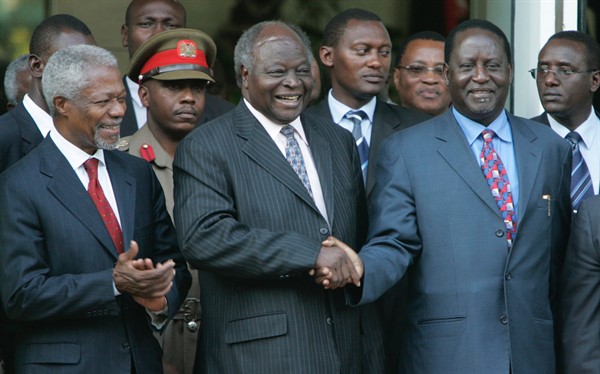Kenyans paid their final respects to former President Mwai Kibaki in a state funeral Friday that was attended by several African leaders. Kibaki, who served two terms as Kenya’s third president from 2002 to 2013, died last month at the age of 90. South African President Cyril Ramaphosa, Ethiopian President Sahle-Work Zewde and South Sudanese President Salva Kiir were among the thousands present at the service in Nyayo National Stadium in Nairobi, Kenya’s capital. Ramaphosa, who spoke at the funeral, eulogized Kibaki as a great statesman “in the mold in which we saw our own first president, President Nelson Mandela.” Similarly, Zewde praised Kibaki, calling him “a true friend of Ethiopia,” while current Kenyan President Uhuru Kenyatta lauded him as “one of the last standing heroes of our independence struggle.”
But the encomiums for Kibaki obscure the full picture of his legacy, including his controversial 2007 reelection, which led to widespread violence and a political crisis that continues to haunt Kenyan politics; an unrealized vision to turn the page on the authoritarianism of his predecessor, Daniel Arap Moi; and a failure to root out corruption from Kenyan politics.
Since his death, Kibaki has been characterized in Kenyan and international media as a gentlemanly, above-the-fray politician who eschewed the combativeness of Moi and other Kenyan political elites. An economist by profession, he had a distinguished career as an academic and public servant, serving as Kenya’s finance minister, vice president and leader of the opposition in parliament before winning the presidency in 2002 and breaking the stranglehold on power of the then-ruling Kenya African National Union, or KANU. Broadly speaking, the mainstream consensus view of Kibaki is of a competent technocrat who ushered in a period of economic growth, infrastructural development and economic modernization, first as finance minister and then as president, while implementing much-needed education reforms.

